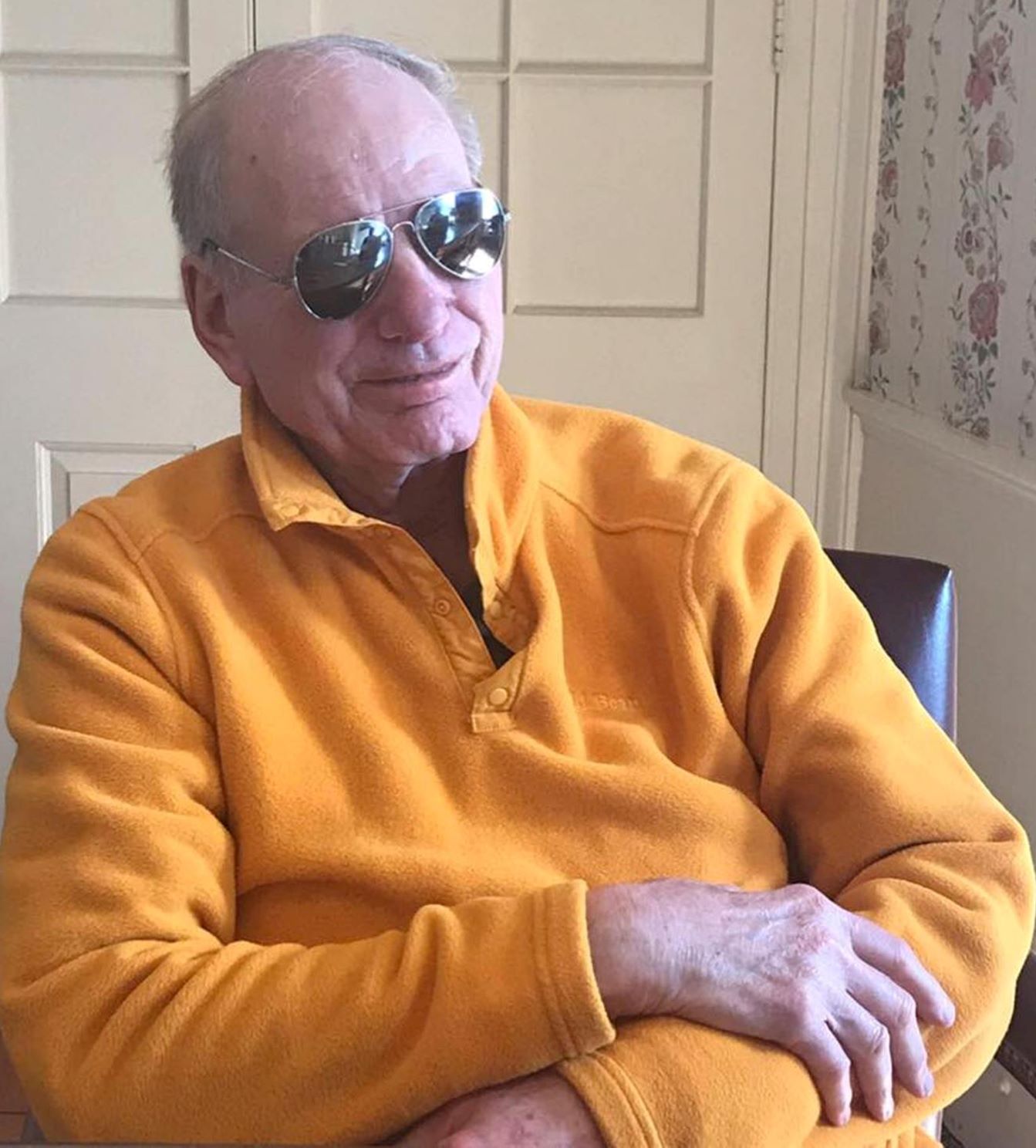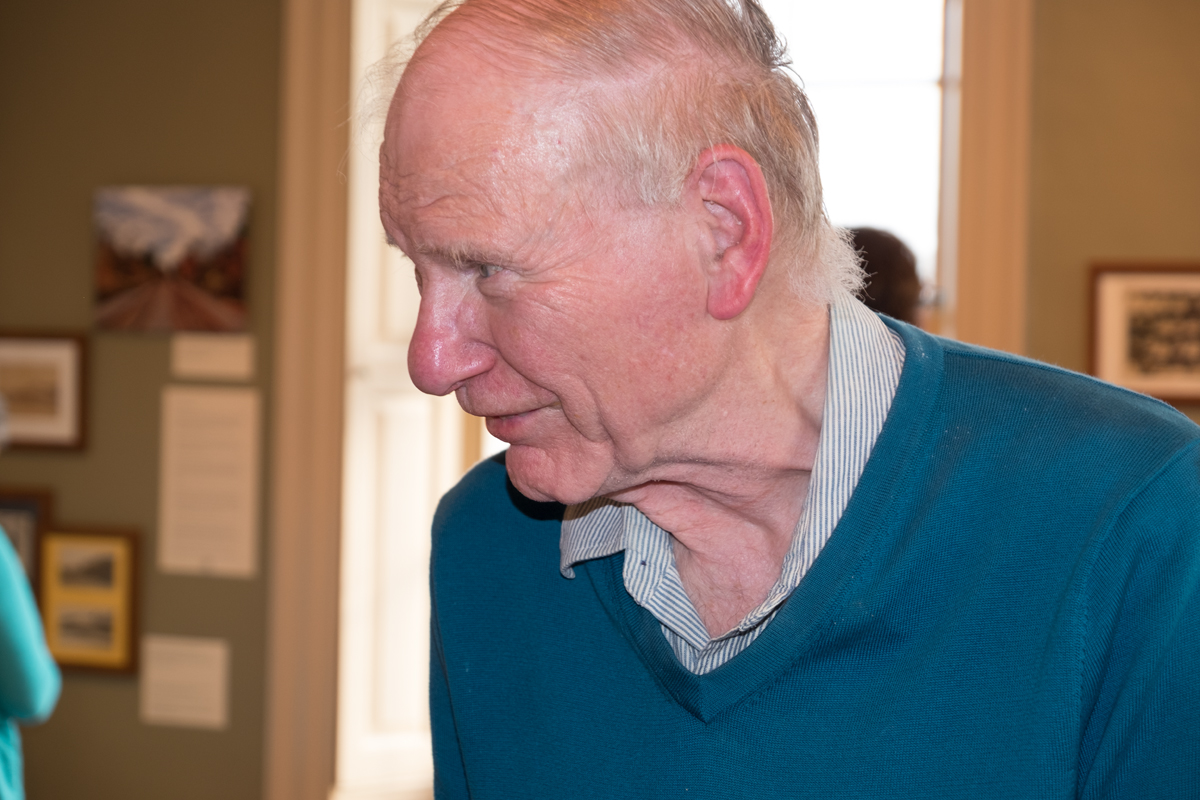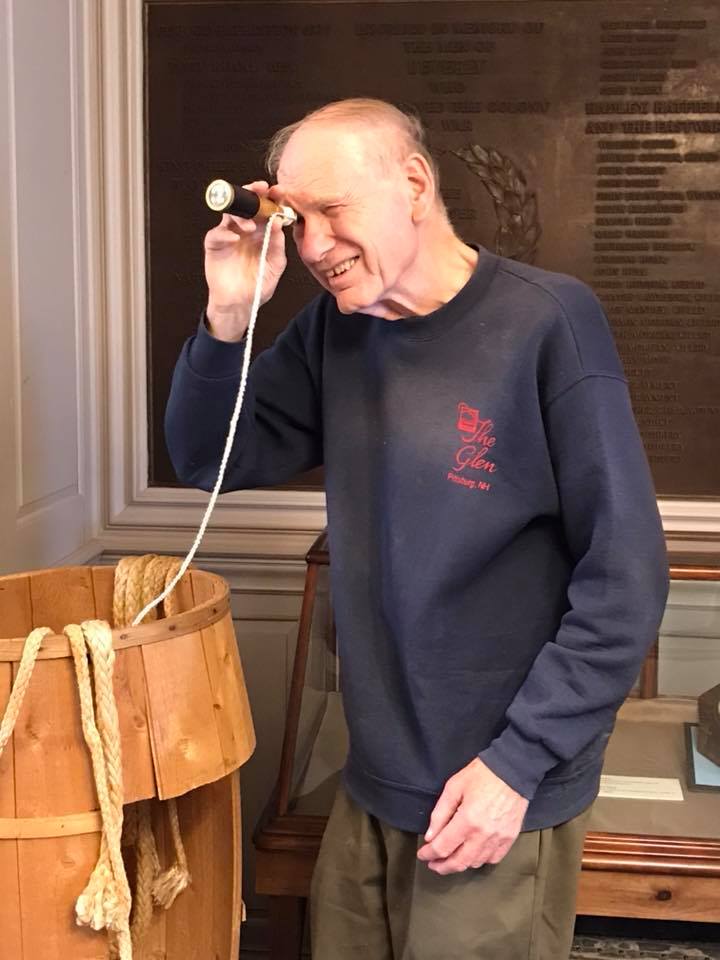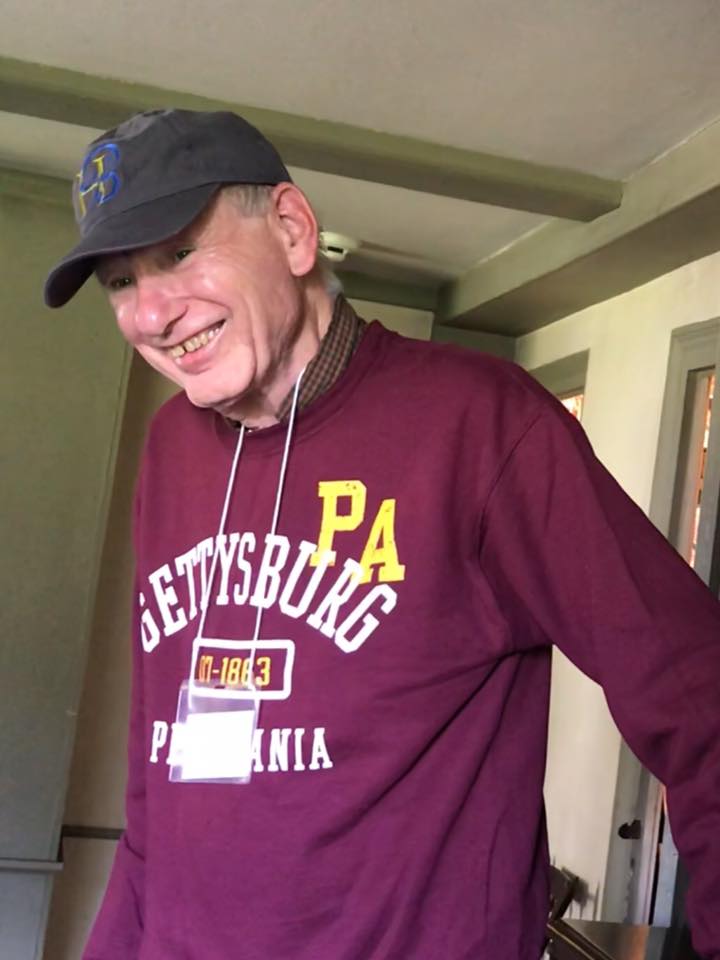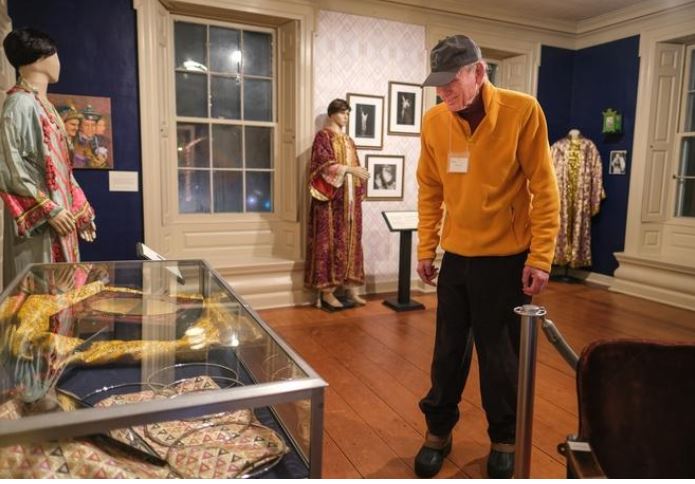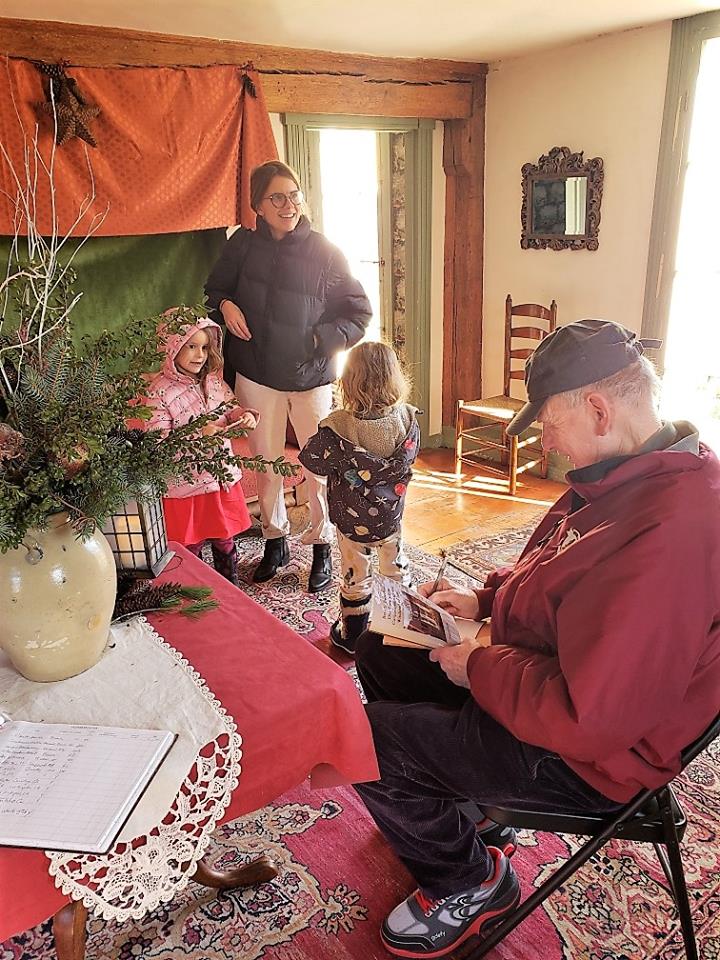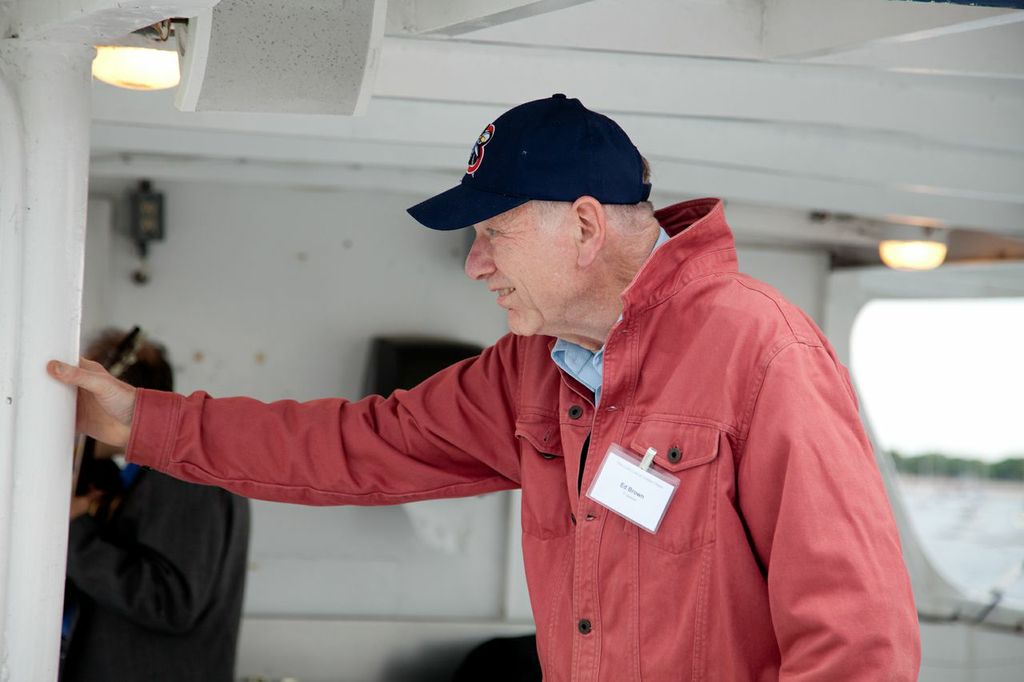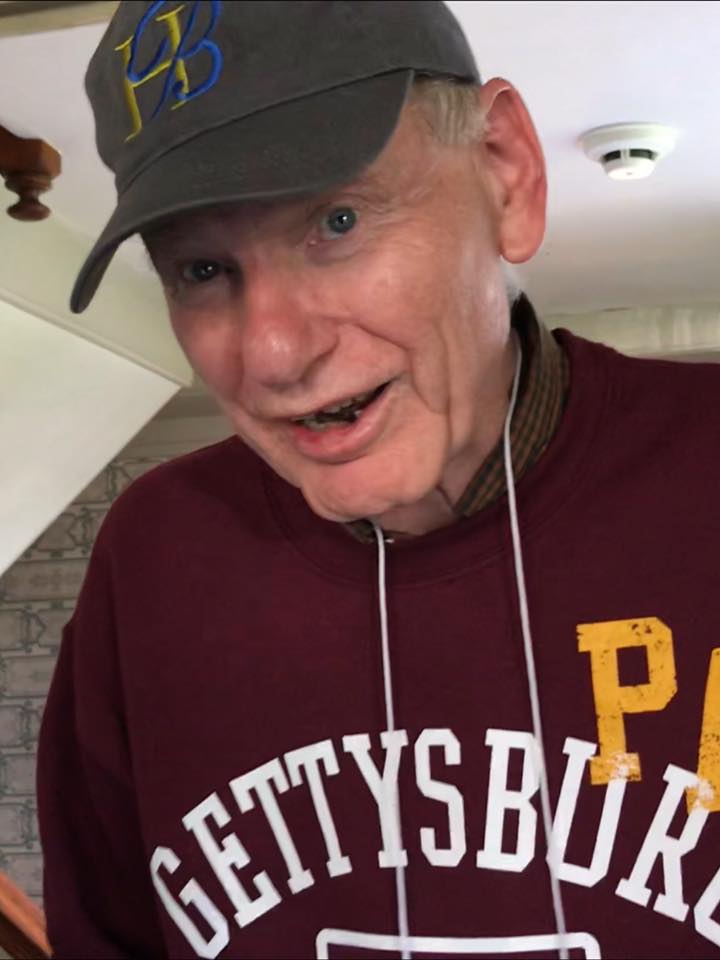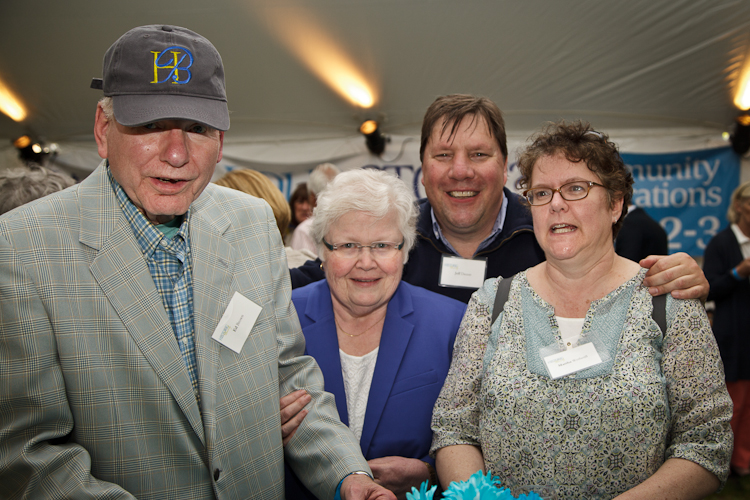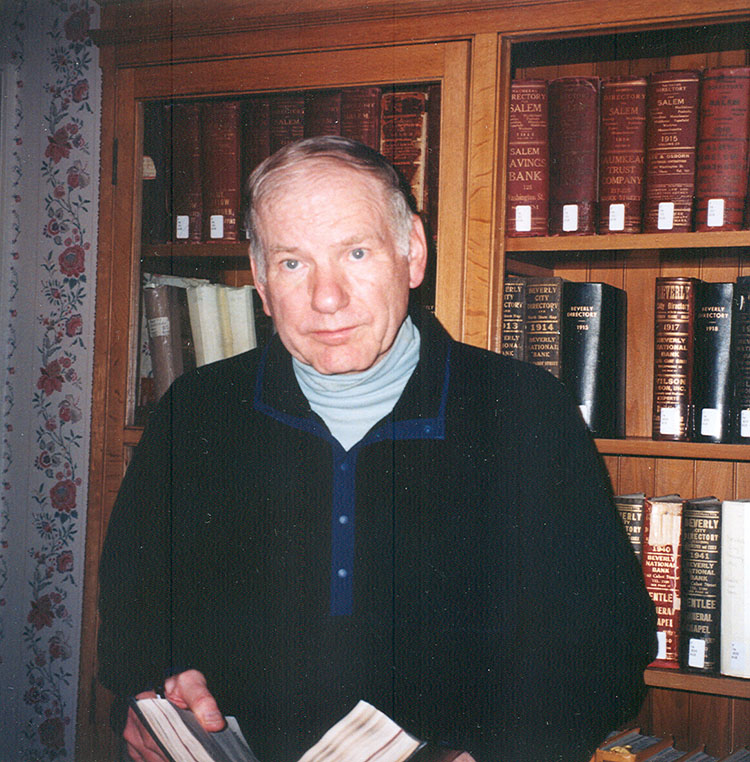Ed Brown was a beloved member of the Historic Beverly family–volunteer, writer, tour guide, committee member and former trustee–and we miss him very much. We are very grateful to everyone who has submitted a memory of Ed. In the upcoming months, we will publish all the stories we have received. Please scroll below to read some of the many memories.
Gail Balentine
The day I walked into what was then the Beverly Historical Society to ask about volunteer opportunities, one of the first people I met was Ed Brown. I grew up in Beverly but didn’t know much about the city’s earlier history at the time, and I had never been inside the Cabot House. I was only there at a friend’s suggestion and I am glad I listened to her.
Ed took me on a tour of the building that I was told would be a short overview – an hour and 15 minutes later I knew a lot about the building, much about Beverly’s founding fathers, and how much I liked the kind man who was educating me. That was the day our friendship began.
I started working as a volunteer and, from that day to the last time I saw him, every time Ed and I met he smiled at me and his face lit up, as it did with the many people he enjoyed talking with. I had the privilege of working with Ed on projects that ranged from putting stamps on envelopes to both of us contributing to two books on Beverly history. I learned from him during practically every conversation we had.
To me, Ed and Historic Beverly were one. There is no doubt in my mind that I and those lucky enough to have worked with him there will think of Ed often and miss him terribly.
Rest in peace, Ed … after you catch everybody in heaven up on Beverly’s sports history.
Babette Loring
Not only has Historic Beverly lost a cherished treasure, but the world has lost a cherished treasure! In his quiet, smiling, happy, passionate, enthusiastic way he was able to inspire so many people to become lovers of history, as he was a lover of all things historical. Not only did he love the past but he was a believer that every day is a day of history. His eagerness for learning was bottomless. A rare encyclopedia existed in his mind and he continually was adding to and drawing from it. He was a role model for all to aspire to.
One of my happiest memories was having dinner with him at the Balch House Thanksgiving dinner, which I had won. He looked at me with the broadest smile and said he never thought he would have dinner at the Balch House and was thrilled and tickled to be doing so. What a gift it was for Peter and me to have him join us!
Donald Carleton
The first time I walked into the Historic Beverly archives back in the summer of 2017, i remember Mr. Brown (along with Mieke and Dakota) as being very friendly and welcoming. In fact, as I was paging through the great archival materials that Dakota was hauling out for me, Mr. Brown brought out the published Cabot genealogy and showed me all the Bilbao-related materials to be found there as well. That published volume has proven to be an invaluable resource that I’ve subsequently used quite heavily in its digitized form.
Mr. Brown was a true gentleman and ambassador for Beverly history, and I can only imagine the impact losing such a valuable member of your organizational community be!
Terri McFadden
My private name for him was ‘Eeyore’ – from the donkey in the A.A. Milne stories. It seemed appropriate in several ways. He was rather slow of speech, but had wisdom to impart, tended to see the dark side of things, yet always lent a helping hand and, above all, was a reliable part of the lives of his friends and colleagues.
When I joined the staff at the Beverly Historical Society, Ed was already a long-time volunteer in the research department. He was unfailingly helpful as I learned the ropes and he shared his incredible knowledge of local history willingly. We made a good team at the Society, working together not only on research and tours, but also writing. He never complained when I edited his work and he did a great job editing mine. Although he often said he couldn’t come up with anything new to write about, he always did. I can see him still, pounding out an article, newspaper style, with his two forefingers, swearing softly (and not so softly) when he hit a key wrong and his piece disappeared or jumped to 200% and he couldn’t figure out how to restore it.
Very early in our association some of his quirks became apparent. Like everyone else who knew Ed well, I got a chuckle out of his “Craptember” badge, worn the first week of September. It was a badge of mourning. I was determined to get to the bottom of his hatred of one of the loveliest months of the year. He didn’t like to talk about, but I slowly learned it was a combination of the end of baseball season, the coming of fall (and cold) and the beginning of school. Once I pointed out that he hadn’t been in school for 60 years and he should get over it. But he felt bad for school children and the end of summer. I said that some kids liked school and he looked at me as if I was crazy. Another time I suggested that since he hated the cold and snow so much, he should go to Florida or Arizona for a month. I got that look again – he was a homeboy to his bones. It took me awhile to realize that he started wearing long sleeve shirts along with the “Craptember” badge, no matter what the temperature. Defiance of something he couldn’t change was basic to his nature.
He never failed to be a kind and thoughtful friend, calling regularly when someone was ill or coping with grief. People remembered Ed, both his tours and his lectures were always popular. He often had visitors or callers on a day when he was at work who he’d coached in baseball decades before. He loved everything about baseball – Little League to the Bigs, and always listened to games on the radio, as he had when he was a boy. When I suggested he might get a TV and watch the games, I got one of those looks again. There was a way to do things and there was no need to change!
He was devout, though he didn’t talk much about his faith. I like to think that he’s up there somewhere tracking down Dorcas Hoar, Christian Trask, John Hale and Margaret Lord. He’ll have his old reporter book in hand and he’ll pepper them with questions. Then he’ll gather a rapt crowd and tell their stories. They’re the lucky ones now. We’ll miss you Ed!
Kyle Smith
Mr. Brown always encouraged me. From school work, to baseball, to writing, to the larger duty of being a good person.
I remember one summer we did a writing exercise where I included an anecdote about Beverly Little League’s most animated umpire, Ernie Lang. Mr. Brown loved it! I think we shared an affinity for taking notice of colorful personalities; these are the characters in the story that we all share as a community.
He was forever a champion of childhood. Mr. Brown detested the end of summer as if he himself were a dejected 9-year-old who had to report back to school. Summer is full of games, bikes, and innocence. He never forgot that a sand timer is set on the days that kids have to find themselves, before they become jaded by the curiosities and burdens of adulthood.
When I went away for school, he often wrote me letters on his typewriter. He signed them “Your friend” or “Your pal”, and he was.
As I grew in to adulthood, Mr. Brown always asked about who I was dating, remembering bits of other peoples’ lives with a journalist-historian’s attention to detail. He asked me about music I was listening to, and would clip newspaper reviews to share what the critics thought to say about those bands. Mr. Brown was a CCR fan, John Fogerty was his guy. A couple of years ago, I sent him something that I had written about music. He responded a week later, sharing his own thoughts, and signing off with another of his trademark phrases, “Rock on!”
Years later, Mr. Brown dared to take on the internet to stay in touch. His email was historiced@comcast.net, an address that pretty much says it all. Mr. Brown’s appreciation for history – of our city, our teams, and of so many of our people – defined him. Mr. Brown was Beverly to the bone.
When I found out that Mr. Brown died in his sleep, the vast geographic gap between California and Beverly widened instantly. I wished I could be at home, playing catch at Bessie Baker, or at a summer cookout with my family and Mr. Brown. But for such a kind hearted and gentle soul, his quiet exit does feel like an appropriate departure.
In meditating some on our friendship, I re-read an email from Mr. Brown that perfectly illuminates his spirit of encouragement. It was 2016, and I was 37 years old. He signed this one, “Good luck with everything you do. I’m still one of your biggest fans.”
Nancy Coffey
Make no mistake. Ed Brown, a friend to all, LOATHED John I. Baker with an undying passion. Just hearing or seeing Baker’s name enraged him. Those who worked with Ed at Cabot House knew how much Ed hated seeing John I. Baker’s name on the big Beverly bean pot in the research room.
Baker had died long before Ed was born and had committed his great transgression at least twenty years before Ed’s grandfather, Thomas Jack, came to Beverly Farms. John I. Baker (1813-1897) was a dedicated public servant who served Beverly in many ways—as the Town’s representative to the General Court, as town clerk and selectman for 17 years. When Beverly became a city, he became the first mayor city. So why did Ed consider Baker the enemy?
In 1886, the people of Beverly Farms petitioned the General Court to allow them to separate from Beverly and create a separate town. The people of Beverly Farms had always felt cut off and neglected by the town of Beverly, but it had taken the initiative of the summer residents to get local Farmers to petition for division. Chief Selectman Baker led the struggle to keep the town united. The petition bill passed the state house and senate. Beverly Farms celebrated with a torch light parade. Then stories of bribery of legislators by the summer residents led Governor Oliver Ames to veto the separation. A second attempt a few years later also failed. Until his dying day, Ed insisted that John I. Baker’s machinations at the General Court had kept Beverly Farms from becoming a separate town.
In 1894 Beverly attained the necessary population to allow it to become a city. John I. Baker became mayor. Ed would tell all who would listen that Baker pushed for Beverly to become a city because it would bind Beverly Farms to Beverly forever; cities could not be divided.
I am sure Ed had no fear of meeting John I. Baker in Heaven. He was sure Baker was already keeping the Devil company in Hell.
Fay Salt
My memory of Ed begins in the fall of 2005. After working outside the city for decades, I found myself working locally; at home on Wednesdays. I had just received the Beverly Historical Society newsletter and there was a note that they were looking for volunteers. I had volunteered at events in the past but now had a bit more time. I was nervous but thought: if there is a parking space nearby I will stop on my way home and inquire. I rang the front bell and a kind gentlemen opened the door: Mr. Ed Brown. After a few moments I realized that I must have some skills they could use because I spent the rest of the day there and many subsequent Wednesdays and Saturdays alongside Ed working on a variety of projects.
I never found a subject Ed could not comment on: names, streets, houses, stories; he knew it all. Ed was the consummate researcher, a man who cared about real facts and the real story behind the story. He had a quick wit and a great sense of humor. He loved giving tours at Hale Farm and talking about one of his favorite Beverly woman, Dorcas Hoar.
I last saw Ed on Memorial Day at the Farms cemetery where he spoke and introduced many other speakers. I commented to Jonathan: they finally got Ed a microphone so we can hear him. We had a good laugh because Ed had much to say and it was a shame not to be able to hear him. I shall remember Ed with that wry smile and recall him trying to get into my car complaining that his size 13 feet made it difficult. They will be tough shoes to fill at Historic Beverly and around town. I will miss him terribly but cherish the many days and evenings we spent volunteering over the years.
More
Peggy Wishart: I count myself a lucky gal to have had the privilege of meeting and spending time with Ed during the brief time I was at Historic Beverly. He welcomed me warmly, immediately stole my heart and often made me giggle with his sweet sense of humor. RIP Ed, you’ll be missed.
Jo Broderick: I worked with Ed for 10 years and we stayed in touch for many years. He was a wonderful, gentle soul.
Linda Burke: Oh no. He gave a wonderful tour of the hale house at night, and helped me locate documents about the origins of our house when we moved here 6 years ago. His love for this town was so clear.
Amanda Ferrante: So sorry to hear this. I volunteered for several years at the Cabot House and loved listening to Ed’s lighthearted stories about the goings-on in Beverly over time. He truly was an incomparable person.
Tina Torsey: Part of our extended family, he will be missed big time!
Darlene Wynne: I’m so sorry. I finally met Ed for the first time a few weeks ago when he gave my family an impromptu tour of the Cabot House exhibits. But his reputation preceded him.
Ellen Parisella: I worked with Ed for several years at the Salem News. Great guy. So pleasant to be around. RIP
Ben Francavilla: When my wife and I first moved to Beverly, we were told of the interesting history of our house on Cross Street. Wanting to learn more, I visited the historical society where Ed couldn’t have been a better researcher; he spent hours finding the history of our home and was genuinely interested in the findings. Before leaving, I made sure to become a member. Since that day, Ed has become a fixture at Halloween, as we love to visit the Hale House for his “spooky” rendition of the area’s history. No doubt, Ed will be missed.
Memories
Jerry Parisella: So sorry to hear this. Ed was my Little League coach and later a colleague at the Salem News. He was also deeply involved in Memorial Day activities in the Farms. He had a vast knowledge of Beverly’s history and will be sorely missed.
James Muse: RIP, Ed. A welcoming man to a “newbie” to Beverly and its Little League some 35 years ago!
Paul Trefry: He walked the walk and talked the talk. He breathed history, and he shared the knowledge with all that listened, and with those whom cared. I hope he rests peacefully within the pages of the history he loved so dearly.
Denise Brewster Nico: How wonderful that he led a full life right til the end.
Gin Wallace: Oh, I’ll miss him. Funny, smart and dedicated to Beverly.
TR Ramsdell: Ed coached my younger brother in little league way back in the mid seventies. He became and remained a lifelong friend to my family, visiting my parents whenever he could. A very kind and soft spoken man, he truly was a natural teacher. When he spoke, you couldn’t help but absorb what he said. His beaming smile will be missed. RIP Ed.
Glenn Gray: A true gentleman will be missed and remembered for a long time. You have earned a peaceful life in the hereafter. How we meet again. Glenn
Laurie Stevens: So sorry to hear this. It seemed that he always knew the answer or where to find things when I went there and he was working. He will be greatly missed.
Christian Gal I am saddened by the news, “Mr Brown” was a kind, gentle and supportive coach. I remember him with great fondness.
Barrett Maass: The best tour guide! A wealth of information and funny stories.
Katherine Ladetto Knapczyk: Our family just recently met him when we joined the organization. He was very kind to my children.
More Ed
Watch Ed talk about baseball, one of his passions, here
Find Ed’s books:
Thieves, Cowbeaters and Other True Tales
Give a Gift to Honor Ed
